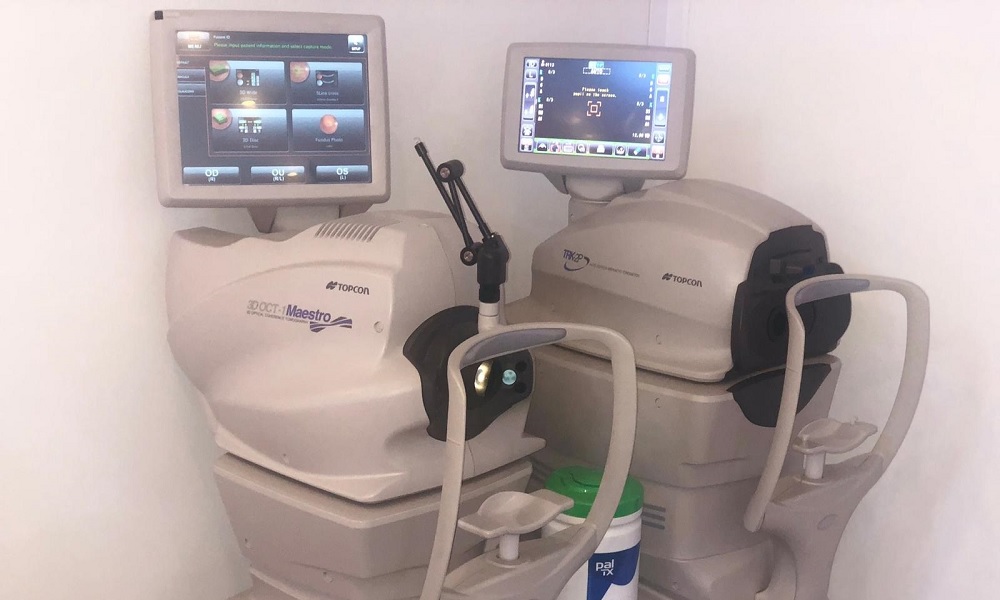-
Phone020-8743-7552
-
Location128 Uxbridge Road

An optical coherence tomography (OCT) scan allows an optometrist to see what's going on beneath the surface of the eye, allowing us to see the health of your eyes in greater detail.
Imagine the back of the eye as a cake; a fundus image would be a 2D digital photograph that shows us the outside of the cake and the icing, but the 3D image from an OCT scan slices and flips the cake on its side so we can see all the layers inside.
At Specialeyes Eyecare, our experienced optometrists can map out and measure the thickness of the retinal layers to gain a better understanding of your eye health.
OCT scans can aid in the early detection of sight-threatening eye conditions. It can also aid in the diagnosis of glaucoma up to four years before any symptoms appear.
When your eyes are tested, an OCT scan gives your optician a better idea of your eye health.
OCT scans are generally recommended for people over the age of 25 who want to learn more about their eye health, as well as those with diabetes, glaucoma, or a family history of eye disease. We are proud to offer this service for free with every sight test for all ages. Even if your vision and eye health are perfect, it is recommended to get an OCT scan with every eye exam. It's extremely beneficial for your optician to keep a baseline image on file so that they can track any changes over time. It's the same as when we take a digital retinal photography image of the back of your eye.
So, the next time you come in for an eye exam, your optometrist will be able to compare your images from your previous visit, as well as compare measurements to averages, and may be able to detect even the smallest change in the eye's structures. This could help find early signs of eye diseases early on.
This means that conditions can be managed before they worsen, potentially preventing vision loss. For a quick scan, that's a pretty good result.
Most opticians normally charge for this service as it is not considered part of your eye examination. The OCT scan is included free of charge with every sight test performed at Specialeyes Eyecare in West London.
An OCT scan only takes a few seconds, and your optometrist will go over the results with you during your eye exam.
OCT scanning is excellent for confirming the health of your eyes and can be repeated over time for comparison. This makes it especially useful for finding conditions that can be dangerous to your eyesight but don't usually show any signs until they start to affect your vision.
Many of these conditions develop at the back of the eye, and OCT allows your optician to detect subtle changes over time, such as changes in the vitreous (the jelly-like substance that fills the eye), the retina (the light-sensitive layer at the back of the eye), the macula (the area at the centre of the retina responsible for our central vision), and the optic nerve (which transmits light impulses to the brain to produce the images we see).
Some conditions that can be detected by OCT are as follows:
An OCT scan, in fact, can detect glaucoma up to four years earlier than traditional methods.
An OCT scan uses light to create over 1,000 images of the back of your eye and beyond, all the way back to the optic nerve, in just a few seconds.
It creates a layered image that gives us an extremely accurate picture of your eye and its structures, allowing us to assess your eye health. The images will be saved so that we can track changes over time.
Yes, both the diabetic eye screening test and the OCT involve taking images of the back of the eye, but there are significant differences.
A fundus photograph is taken during a diabetic eye check. This is an image of the surface of the back of the eye (the retina), also known as digital retinal photography. OCT images allow us to see the many layers beneath the surface of the retina, allowing us to detect changes in eye health earlier than if we only looked at the surface.
OCT scans can also detect a variety of other eye problems, not just those associated with diabetes.
Feb 11, 2023 Written by Hayder What is OCT Scan & What Does an OCT Scan do?
@ Specialeyes Eyecare Opticians | Website Design By LWDS